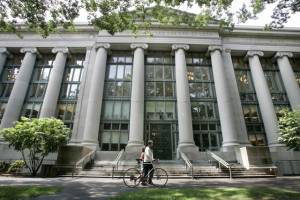Not wanting to support radical anti-Israel stances and activities, the Milbank law firm has asked that its donations be used to fund positive activities.
A major backer of Harvard Law School has stopped sponsoring student events after its donation helped pay for a discussion on activism for the non-existent state of Palestine.
In 2012, the international law firm Milbank promised Harvard $1 million over five years to pay for scholarly conferences organized by law students. But after the money was used to support an event hosted by the anti-Israel student Students for Justice in Palestine (SJP), the law firm asked Harvard Law School to use the money for other purposes.
Calls to Milbank’s New York headquarters weren’t returned this week. In a statement, Harvard said Milbank was never involved in deciding which events to fund and that the school will now pay for student events with other resources.
Harvard says Milbank wanted to “avoid creating any misimpressions that the firm endorses the viewpoints expressed by any particular student organization or journal,” according to the statement, provided by law school spokesman Robb London.
In October, students in Justice for Palestine hosted a talk examining what they say is a movement to suppress advocates of Palestine. Harvard had previously awarded the group $2,000 to hold events throughout the semester using the Milbank donation. The group says it spent about $500 for pizza at the fall discussion.

Harvard law school. (AP/Charles Krupa)
Before the event, an email from the law school’s dean told the group that Milbank’s logo must be “prominently displayed” on all advertisements. In that spirit, the group thanked the law firm in a Facebook page advertising the event, said Collin Poirot, a first-year Harvard law student and a member of the organization.
The next day, law school administrators asked the group to remove all references to Milbank on their Facebook page, citing complaints from the law firm, Poirot said. And soon after, students were notified that the Milbank Student Conference Fund was being discontinued.
Harvard declined to comment beyond its statement, which says that Milbank “decided there are other ways its support could be used” at the law school. The school didn’t explain how the remainder of the donation will be used, but added that “Milbank has not terminated its five-year gift or its support for the law school.”
Leaders of Justice for Palestine said they see the move as a political response to their message.
“We expect this kind of thing,” Poirot said. “There’s always been a price to pay in America for being pro-Palestine.”
Students at Columbia Law School in New York, which also receives money from Milbank for events, are worried that they might lose funding, too, said Katherine Franke, a law professor there.
“This kind of influence will have a chilling effect, to be sure, on the kinds of things students feel comfortable saying,” Franke said. “We should celebrate robust discussions about the most difficult issues of the day, including viewpoints that might make us uncomfortable.”
Harvard, in its statement, defended Milbank.
“The law school and Milbank are committed to freedom of speech,” the statement said. “We have an exceptionally strong relationship with Milbank, which has acted appropriately and with the highest integrity in all respects.”
By: AP and United with Israel Staff
